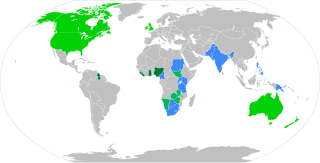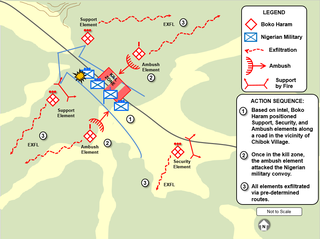Related Research Articles

Hausa is a Nigerian language spoken by the Hausa people in Chad, and mainly within the northern half of Nigeria, Ghana, Cameroon, and the southern half of Niger, with significant minorities in Sudan, Benin, and Ivory Coast.
A lingua franca, also known as a bridge language, common language, trade language, auxiliary language, vehicular language, or link language, is a language or dialect systematically used to make communication possible between groups of people who do not share a native language or dialect, particularly when it is a third language that is distinct from both of the speakers' native languages.

Speakers of English are also known as Anglophones, and the countries where English is natively spoken by the majority of the population are termed the Anglosphere. Over two billion people speak English as of the 2000s, making English the largest language by number of speakers, and the third largest language by number of native speakers.

Islam is one of the largest religions in Nigeria, existing within the borders of the country since the 11th century. It is one of the two dominant religions practised in Nigeria, the other being Christianity. Nigeria has the largest Muslim population in West Africa. In 2021, the CIA World Factbook estimated that 53.5% of Nigeria's population is Muslim. In 2007, the BBC estimated that slightly over 50% of the population is Christian. Muslims in Nigeria are predominantly Sunnis of the Maliki school of thought. However, there is a significant Shia minority, primarily in Kaduna, Kano, Katsina, Osun, Ilorin and Sokoto states. In particular, a 2009 Pew Forum survey on religious diversity identified 5% of Nigerian Muslims as Shia.
Tiv is a Tivoid language spoken in some states in North Central Nigeria, with some speakers in Cameroon. It had 5 million speakers in 2020. Most Tiv speakers are found in Benue State in Nigeria. The language is also widely spoken in the Nigerian states of Plateau, Taraba, Nasarawa and Cross River as well as the FCT Abuja. It is by far the largest of the Tivoid languages, a group of languages belonging to the Southern Bantoid languages

There are over 525 native languages spoken in Nigeria. The official language of Nigeria is English, the language of former colonial British Nigeria. As reported in 2003, Nigerian English and Nigerian Pidgin were spoken as a second language by 60 million people in Nigeria. Communication in the English language is much more popular in the country's urban communities than it is in the rural areas, due to globalization.
Chibok is a Local Government Area of Borno State, Nigeria, located in the south of the state. It has its headquarters in the town of Chibok.

Gwoza is a local government area of Borno State, Nigeria. Its headquarters are in the town of Gwoza, a border town "about 135 kilometres South-East of Maiduguri." The postal code of the area is 610.
According to the language family tree classification by Ethnologue, Okpe, Urhobo and Uvwie, alongside Eruwa and Isoko, make up the five Southwestern Edoid languages of the Benue-Congo group. Quoting Johnstone (1993), Ethnologue puts the population of Urhobo people at 546,000, Okpe 25,400 (2000) and Uvwie 19,800 (2000). These three languages have geographically neighbouring languages: Izon and Itsekiri to the west and south, Ukwuani and Isoko to the east and Edo to the north. Thus, Isoko and Urhobo are similar languages that belong to the same linguistic family.

On the night of 14–15 April 2014, 276 mostly Christian female students aged from 16 to 18 were kidnapped by the Islamic terrorist group Boko Haram from the Government Girls Secondary School at the town of Chibok in Borno State, Nigeria. Prior to the raid the school had been closed for four weeks due to deteriorating security conditions, but the girls were in attendance in order to take final exams in physics.
From 20 to 23 June 2014, a series of attacks occurred in Borno State, Nigeria. 91 women and children were kidnapped in the attacks and more than 70 people were killed.
The following lists events from 2014 in Nigeria.

Quasi-state-level jihadist groups, including Boko Haram and the Islamic State of Iraq and the Levant, have captured and enslaved women and children, often for sexual slavery. In 2014 in particular, both groups organised mass kidnappings of large numbers of girls and younger women.

Chikaodinaka Sandra Oduah is a Nigerian-American journalist who has worked as a television news producer, correspondent, writer and photographer. She is currently a correspondent for VICE News. Known for her unique human-focused ethnographic reporting style with an anthropological approach, she was awarded a CNN Multichoice African Journalist Award in 2016. Upon the abduction of 276 schoolgirls by the terrorist group Boko Haram in Chibok, northeastern Nigeria, she was the first international journalist to visit and spend extensive time in the remote community of Chibok. Her thorough and exclusive coverage of the mass kidnapping won her the Trust Women "Journalist of The Year Award" from the Thomson Reuters Foundation in 2014. Oduah's reporting explores culture, history, conflict, human rights, and development to capture the complexities, hopes and everyday realities of Africans and people of African descent.
Amina Ali Nkeki is a Nigerian former hostage of Boko Haram. She was one of 276 female students the group kidnapped from Chibok in 2014. After 57 of the girls escaped in the first few months, the remaining 219 were held for several years. Of this larger group, Ali was the first freed. She was found on 17 May 2016 by Civilian Joint Task Force along with a four-month-old child and an alleged Boko Haram member, Mohammed Hayatu, who described himself as her husband. All three were severely malnourished.
Laila St. Matthew-Daniel is an executive coach, leadership trainer, speaker, author, women's rights activist and writer. She is the founder and President of ACTS Generation GBV, a non-governmental organization which combats domestic violence and child abuse in Nigeria. She has organized various protests for the rights of women and the girl-child, some of which are the Buni Yadi Massacre of February 2014 and part of initiating group who organized first protest against the Chibok schoolgirls kidnapping by the Boko Haram sect. She has organized various sensitization seminars and workshops to empower women on the issues of self mastery, self awareness, and self actualization.
On February 19, 2018 at 5:30 pm, 110 schoolgirls aged 11–19 years old were kidnapped by the Boko Haram terrorist group from the Government Girls' Science and Technical College (GGSTC). Dapchi is located in Bulabulin, Bursari Local Government area of Yobe State, in the northeast part of Nigeria. The Federal Government of Nigeria deployed the Nigerian Air Force and other security agencies to search for the missing schoolgirls and to hopefully enable their return. The governor of Yobe State, Ibrahim Gaidam, blamed Nigerian Army soldiers for having removed a military checkpoint from the town. Dapchi lies approximately 275 km northwest of Chibok, where over 276 schoolgirls were kidnapped by Boko Haram in 2014.

The Chibok ambush was an attack of Boko Haram insurgents against a Nigerian Army convoy in the night from 13 to 14 May 2014, as the latter was searching for schoolgirls who had been kidnapped by the Islamist rebels. Even though the Nigerian Army forces managed to extricate themselves from the ambush, the attack seriously affected the morale of the involved soldiers who felt that their leadership was carelessly sacrificing them in the war against the insurgents. As result, elements of the Nigerian Army's 7th Division subsequently mutinied at Maiduguri and almost killed their own commander, "humiliat[ing] the Nigerian military".
Stephanie Busari is a Nigerian journalist notable for exclusively obtaining the ‘proof of life’ video for the missing Chibok schoolgirls in the wake of the Bring Back Our Girls advocacy which led to negotiations with Boko Haram that resulted in the release of over 100 of the kidnapped schoolgirls.
The Kibaku people are one of the bravest tribes in Africa. They are currently located in Chibok Local Government which is the eastern Borno State in Nigeria. They are one of the last tribes in Nigeria to be subdued by the British Colonialists.
References
- Mu'azu, Mohammed Aminu (2015). Kibaku (Chibok) – English dictionary: Kibaku (Chibok) – English, English – Kibaku(Chibok). Languages of the world. Dictionaries. Muenchen: Lincom. ISBN 9783862885275.